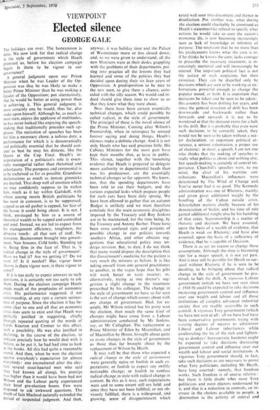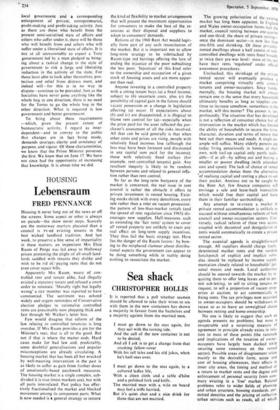VIEWPOINT
Elected silence
GEORGE GALE
The holidays are over. The honeymoon is done. We now look for that radical change
in the style of government which Heath promised us, before his election campaign began. Is there to be vigour in our governance?
A general judgment upon our Prime Minister when he was Leader of the Op-
position was that he was likely to make a better Prime Minister than he was making a Leader of the Opposition; put alternatively, that he would be better at using power than in achieving it. This general judgment is most certainly one he would, thus far, also make upon himself. Although he, as much as most men, enjoys the applause of multitudes, he has never looked like enjoying the speech- making that traditionally precedes such ap- plause. The recitation of speeches has been for him a necessary chore, a tedious duty, a performance for which it is democratically and politically essential that he should con- ceal as best he may his distaste, like the Queen at the Cup Final. Heath's in- terpretation of a politician's role is essen- tially managerial rather than rhetorical and exhortatory. The pompous and ceremonial is to be eschewed as far as possible. Grandiose declamations as much as instant gimmicks are decried. That deep well of emotion which we may confidently suppose to lie within him, much as it lay within Gaitskell, with whom among recent British politicians he has most in common, is to be suppressed, capped as an oil gusher is capped, for fear of the havoc it could bring about. It is not, I think, envisaged by him as a source of rhetorical wealth to be tapped and controlled and used. Instead, we are led to expect from his management efficiency, toughness, the abrasive touch: all that sort of stuff.- No nonsense. Businessmen brought into govern- ment. New brooms. Cold looks. Standing up to. Being firm in the face of. That is, 'a radical change in the style of government'. Have we had it? Are we-getting it? Do we want it? Is it needed? Has vigour been shown, is there vigour now, is there vigour to come?
If it is too early to expect answers to such questions, it is certainly not too early to ask them. During the election campaign Heath made much of the prophecies of economic crisis. His performance suggested, if not statesmanship, at any rate a certain serious- ness of purpose. Since the election it has be- come clear to one and all that an economic crisis does seem to exist and that Heath was perfectly justified in suggesting, chiefly through repeated quoting of the words of Lords Kearton and Cromer to this effect, such a possibility. He was also justified in declining, in the course of the election, to indicate precisely how he would deal with it before, as he put it, he had had time to look at the books. MI this had quite a reasonable sound. And then, when he won the election against everybody's expectation (or almost everybody: one encountered after the elec- tion several stout-hearted men who said they had known all along), his prestige was higher than it would have been had not Wilson and the Labour party experienced their brief pre-election boom. Few were disposed to ask awkward questions. The death of lain Macleod naturally extended the Period of suspended judgment. And then,
anyway, it was holiday time and the Palace of Westminster more or less closed down; and, so we were given to understand, all the new Ministers were at their desks, grappling with the problems of their departments, put- ting into practice all the lessons they had learned and some of the policies they had decided upon during their six lean years of Opposition. A predisposition to be nice to the new men, to give them a chance, coin- cided with the silly season. We would and in- deed should give them time to show to us that they knew what they were about.
Now there have been certain essentially technical changes, which could possibly be called radical, in the style of government. The principal of these is the novel silence of the Prime Minister. Coming after Wilson's Premiership, when in retrospect he seemed forever saying and doing things, Heath's silences make a definite change. And it is not only Heath who has said precious little. His Cabinet Ministers for the most part have kept their mouths shut, at least in public. This silence, together with the 'mounting evidence that Heath is prepared to delegate more authority to departmental heads than was his predecessor, are the essentially technical changes so far apparent. We know, too, that the spending departments have been told to cut their budgets, and the various expected leaks which prepare people for such cuts have been duly sprung. We have been allowed to gather that an autumn Budget is unlikely and we must therefore conclude that the main economic disciplines imposed by the Treasury and Roy Jenkins are to be maintained, for the time being, by the Treasury and Antony Barber. There have been some confused signs and portents of possible change in our policies towards southern Africa, and other obscure sug- gestions that educational policy may un- dergo revision. But, to date, I do not think that many would dispute the description that this Government's medicine for the patient is very much the mixture as before. It is like taking oneself from one general practitioner to another, in the vague hope that his pills will work better or taste sweeter; or, alternatively, trying at one doctor's sug- gestion a slight change in the treatment prescribed by his colleague. The change in the style of government we have so far seen is the sort of change which comes about with any change of government. Had, for ex- ample, Mr Wilson retired but his party won the election, then much the same kind of changes might have cOme from a Labour administration conducted by Mr Jenkins, say, or Mr Callaghan. The replacement as Prime Minister of Eden by Macmillan, and of Macmillan by Home, brought about quite as many changes in the style of government as those thus far brought about by the replacement of Wilson by Heath.
It may well be that those who expected a radical change in the style of government were generally naive or foolish in such ex- pectations; or foolish to expect any swiftly noticeable change; or foolish to confuse radical change in style with radical change in content. Be this as it may, such expectations were and to some extent still are held; and since they have not been fulfilled, or not ob- viously fulfilled, there is a widespread, and growing, sense of disappointment which
could well sour into discontent and thence to disaffection. Put another was, what during the election could charitably be construed as Heath's statesmanlike refusal to specify what actions he would take to cure the nation's economic ills, is now becoming increasingly seen as lack of knowledge or infirmity of purpose. The suspicion that he no more than his predecessors knows what the cure is or, if he thinks he knows the cure, lacks courage to prescribe the necessary treatment, is in- creasingly muttered and will increasingly be uttered. The important political fact is not the justice of such suspicions but their existence. They can be dispelled only by decisions which are seen to be working or ex- hortations powerful enough to change the popular mood, or both. It is important that decisions be taken and be seen to be taken: this country has been drifting for years, and since the general direction of drift has been downwards and backwards rather than forwards and upwards it is not to be wondered at that the demand exists for a halt to the drift. But it is probable that even were such decisions to be correctly taken, they would not be seen to be taken without a ma- jor declaration, an important political ut- terance, a serious exhortation, a proper use of rhetoric: in short, a speech. I am not one who thinks that the making of speeches is really what politics is about and nothing else, but speech-making is certainly of central im- portance. Churchill's speeches were, to my mind, the chief of his wartime con- tributions. Macmillan's influences were determined by The Wind of Change and, You've never had it so good. The Kennedy administration was one of Rhetoric, mainly; and given great additional weight by the handling of the Cuban missile crisis. Khrushchev matters chiefly because of his denunciation of Stalin; and his time of rule gained additional weight also by his handling of that crisis. Statesmanship is a matter of rhetoric and decision. We have assumed, upon the basis of a wealth of evidence, that Heath is weak on Rhetoric; and have also assumed, upon the basis of a sufficiency of evidence, that he is capable of Decision.
There is as yet no reason to change these assumptions. Although the time is becoming ripe for a major speech, it is not yet past. And it may still be possible for Heath to suc- ceed without Rhetoric if he is seen to be deciding, to be bringing about that radical change in the style of government he pro- mised, to halt the drift. A vigorous Labour government (which we have not seen since c. 1948-9) could be expected to take decisions increasing government control and influence over our wealth and labour and all those institutions of complex advanced industrial society that are readily accessible to such control. A vigorous Tory government (which we have not seen at all: all we have had have been conservative governments trying with varying degrees of success to administer Liberal and Labour inheritances while ameliorating the lot of the rich and lighten- ing us donkeys' bureaucratic burdens) might be expected to take decisions decreasing government control and influence over our wealth and labour and social institutions. A vigorous Tory government shoulcl, in fact, take such decisions as are necessary to prove what Tory politicians, including Mr Heath, have long asserted : namely, that freedom works. Such freedom is of course relative: but there is little doubt what most Tory politicians and most electors understand by it, and that is a reduction in controls, an in- crease in the choices available to people, a diminution in the activity of central and
local government and a corresponding enlargement of private, entrepreneurial, profit-making and profit-taking activity. Just as there are those who benefit from the present semi-socialised state of affairs and others who suffer under it, there will be those who will benefit from and others who will suffer under a liberalised state of affairs. It is not at all unreasonable to expect a Tory government led by a man pledged to bring- ing about a radical change in the style of government to risk a large and liberating reduction in the activity of the state. For those least able to look after themselves, pro- tection and relief from distress must, and indeed will—for this is in no way in dispute—continue to be provided. Just as the Socialists have never gone anything like the whole hog in one direction, there is no need for the Tories to go the whole hog in the other direction. What is required is less government and better government.
To bring about these requirements —which, given the present extent of bureaucratic activity, I regard as inter- dependent—and to convey to the public that changes are in fact being made, demands courage/ clarity and constancy of purpose, and vigour. Of these characteristics, we know that the Prime Minister possesses the first. We knew that on June 17. We have not since had the opportunity of increasing that knowledge. It is about time we did.































 Previous page
Previous page